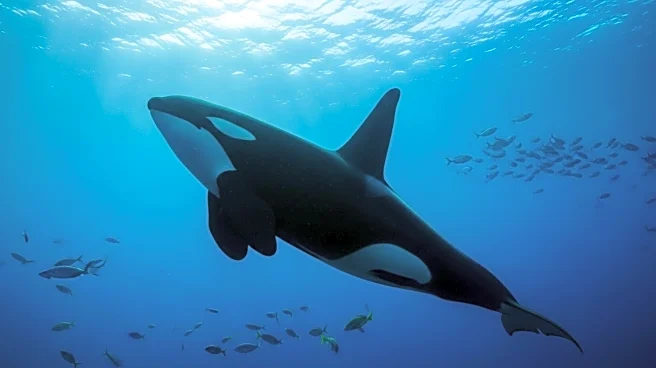What is the story about?
What's Happening?
In recent years, orcas have emerged as formidable rivals to great white sharks, traditionally seen as the ocean's apex predators. This shift was notably observed in Australian waters, where orcas have been documented preying on great whites. The first confirmed case occurred in October 2023, when a great white shark carcass was found near Portland, Victoria, with its liver and other organs removed with precision. Genetic analysis confirmed orca involvement, marking a significant change in predator dynamics. Orcas employ strategic hunting techniques, targeting the energy-rich liver of sharks, which is laden with lipids. This behavior has been observed in other regions, such as South Africa and California, where orca presence has led to a decline in great white shark sightings and altered marine ecosystems.
Why It's Important?
The rise of orcas as apex predators could have profound implications for marine ecosystems. Great white sharks play a crucial role in regulating populations of seals and fish, and their displacement could disrupt these balances. In South Africa, orca predation has led to a significant reduction in great white shark numbers, affecting local marine life dynamics. Similar effects have been noted in California, where orcas have caused great whites to abandon key hunting grounds. If this pattern continues in Australia, it could lead to shifts in food webs and ecosystem structures, highlighting the interconnectedness of marine species and the potential for cascading ecological impacts.
What's Next?
The ongoing observation of orca predation on great white sharks will be crucial in understanding the long-term effects on marine ecosystems. Researchers are monitoring these interactions to assess their frequency and impact. The potential redistribution of shark populations could lead to changes in seal and fish numbers, necessitating adjustments in conservation strategies. As orcas continue to challenge the dominance of great whites, scientists and policymakers may need to consider new approaches to marine management and protection.
Beyond the Headlines
The emergence of orcas as apex predators raises questions about the adaptability and intelligence of marine species. Orcas' strategic hunting methods reflect their complex social structures and problem-solving abilities, offering insights into animal behavior and evolution. This development also underscores the dynamic nature of ecosystems, where shifts in predator-prey relationships can lead to unforeseen consequences. Understanding these changes is vital for preserving biodiversity and maintaining ecological balance.
















